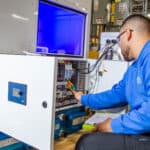
Innovation with Integrity: AIRSYS USA’s Approach to Responsible Manufacturing
April 25, 2024
Exploring the Advanced Cooling Technologies of the Future
April 25, 2024It has already been widely acknowledged that data center cooling can’t be compromised. To put it bluntly, even a brief cooling outage can trigger catastrophic fallout, impacting both end-users and data center operators. With that in mind, precision cooling technologies have earned a reputation for being the ideal data center cooling solution.
Three Cardinal Elements Affecting Data Centers’ Performance
Temperature Control
Temperature swings are among the most impactful factors on data centers’ performance. Overheating causes thermal stress on IT equipment, while excessively low temperatures lead to condensation risk. Either extreme is far from ideal, jeopardizing IT equipment longevity and performance, and resulting in interrupted operations, outages, costly repairs, and data loss. Hence, maintaining consistent temperature control within the recommended range is vital for data centers’ optimal and reliable performance.
Humidity Control
Just as unstable temperatures pose risks, fluctuating humidity levels also threaten data center operations. High humidity builds up condensation that compromises electrical components, whereas low humidity increases static electricity buildup, potentially harming sensitive IT equipment. Therefore, advanced humidity monitoring and control are critical to ensuring data centers’ fail-safe performance.
Airflow Control
Proper airflow distribution prevents hot spots by evenly circulating cool air throughout the data center. When airflow is compromised, cooling systems strain to compensate, hindering productivity and driving up energy costs. Thus, optimized airflow management is vital for reliable data centers’ functioning and efficiency.
The Emergence of Precision Air Conditioning
As data centers grew in prevalence and criticality, the need for a cooling technology capable of dissipating immense heat loads while safeguarding sensitive equipment emerged. This fueled the development of precision AC systems, designed purposefully with advanced features and competencies:
- Optimized cooling for high heat densities
- Proper ventilation with integrated air filtration
- High sensible heat ratio (SHR)
- Self-diagnostic sensors for monitoring temperature and humidity deviations with self-correcting functions
- Quick responsiveness to sudden temperature fluctuations
- Redundant components (e.g., compressors, fans, etc.)
- Lightweight and durable evaporator design for efficient heat transfer
- Continuous 24/7 operation
A Perfect Match
When comparing the features and technicalities of precision cooling with the critical parameters for achieving optimal data center operation, you get a perfect match.
The functionalities and design behind precision AC technology translate perfectly into the three critical factors required for peak performance in data centers. Specifically, the capacity to monitor and regulate temperature and humidity levels, coupled with efficient airflow management capabilities, and empowered by durable and redundant components built for continuous operation — all these facilitate the perfect conditions for smooth, uninterrupted, reliable data center operation without compromise.
Optimal Performance
| Precision Cooling Technology | What a Data Center Needs |
| Optimized cooling for high heat densities | Temperature control
Humidity control Airflow control |
| High SHR | |
| Proper ventilation | |
| Integrated air filtration | |
| Lightweight and durable evaporator | |
| Self-diagnostic sensors with self-correcting functions | Reliable operation |
| Responsiveness to temperature fluctuations | |
| Redundant components | |
| 24/7 operation |
“Over the years the equipment in data centers has evolved into high-tech pieces of equipment with extremely fast processing chips. With this evolution in equipment, the cooling requirements have started to become much more essential. Throughout the year, most cooling manufacturers have not changed their mindset in how they cool data centers. To provide a reliable and high-performing system, the temperature in a data center needs to be kept at a steady constant temperature. This is where precision cooling comes into place.”
Colin DeMarlie, AIRSYS’ Director of Data Center/Telecom Sales
Additional Benefits of Precision Air Conditioning for Data Centers Cooling
Beyond ensuring reliable, optimized performance, integrating precision cooling into data centers and server rooms delivers several other compelling benefits:
- Energy Efficiency — Targeted cooling and airflow distribution eliminate wasteful overcooling, significantly reducing energy consumption and environmental impact.
- Improved Air Quality — Precision AC technology incorporates advanced filtration to maintain superior air quality and reduce particulate contamination risks.
- Equipment Longevity — Optimal temperature management and clean air extend IT equipment lifespan.
- Proactive Maintenance — Built-in sensor monitoring provides early detection of emerging issues before they escalate into failures.
- Scalability — Precision cooling solutions can be designed with flexibility to accommodate future capacity expansion.
- Cost Saving — Despite the high initial upfront costs, precision air conditioning delivers long-term cost savings through extended equipment life, energy efficiency, reduced repairs, and maximum uptime.
Why Aren’t Comfort Cooling Solutions Good Enough For Data Center Cooling?
Comfort cooling solutions, while appropriate for general indoor environments, fall short when it comes to cooling data centers optimally.
The main reason lies in the unique heat load that data center equipment generates. Unlike residential or commercial buildings, data centers house critical equipment that produces a significant amount of heat per watt of power. If not effectively removed, this concentrated heat load can increase ambient temperature beyond safe levels, ultimately resulting in equipment failure. As comfort air conditioners are designed for general heating and cooling purposes, they lack the capacity to manage such concentrated heat loads. Furthermore, they are not equipped to provide the precise temperature and humidity conditions required by sensitive electronic equipment in data centers.
In addition, the operational demands of data centers compel continuous cooling. Precision air conditioners are specifically engineered for this purpose, designed to operate non-stop, 24 hours a day, 365 days a year. These systems are equipped with components selected for high reliability and redundancy to ensure zero downtime, regardless of outside weather conditions or indoor heat intensity. In contrast, comfort air conditioners are designed for sporadic use, typically during hot summer days, and are not intended for continuous operation or harsh winter conditions. For that reason, comfort cooling systems can’t support the rigorous demands of data center operations, making them inadequate for maintaining the critical cooling requirements of data centers.
Mission-Critical Performance is Precision Cooling’s Mission
Delivering optimal and reliable cooling is in precision air conditioning’s job description. This inherent capability makes precision AC ideally suited for mission-critical applications, from control rooms and satellite stations to expansive server rooms and data centers, where even brief lapses in cooling can lead to devastating consequences.
At AIRSYS, we specialize in delivering advanced and innovative data center cooling solutions that leverage precision cooling technologies. When your data center remains cool, reliable, and efficient, we know we did our job right. As global leaders in energy efficiency, we are committed to your success. For tailored cooling solutions or any other inquiry, feel free to contact us online.
Sources:
https://www.jasc.ch/keeping-it-cool-the-vital-role-of-ac-in-data-centers
https://www.kl-telecom.com/news/why-are-precision-air-conditioners-preferred-for-data-centers.html
https://dataspan.com/blog/stop-complicating-data-center-airflow-management/
https://www.backblaze.com/blog/data-centers-temperature-and-power/
https://dataspan.com/blog/stop-complicating-data-center-airflow-management/




